0 Volumes
No volumes are associated with this topic
Philadelphia Legal
Legal Philadelphia is full of crooks, but some lawyers are saints.
Franklin Endorses the Constitution
Monday Sepr. 17, 1787. In Convention (6th and Chestnut, Philadelphia).
The Engrossed Constitution being read, Doctor. Franklin rose with a Speech in his hand, which he had reduced to writing for his own convenience, and which Mr. Wilson read in the words following:
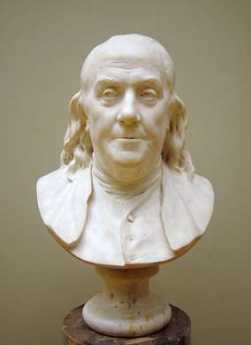
|
| Bust of Benjamin Franklin |
I confess that there are several parts of this constitution which I do not at present approve, but I am not sure I shall never approve them: For having lived long, I have experienced many instances of being obliged by better information or fuller consideration, to change opinions even on important subjects, which I once thought right, but found to be otherwise. It is therefore that the older I grow, then after I am to doubt my own judgment and to pay more respect to the judgment of others. Most men indeed as well as most sects in Religion, think themselves in possession of all truth, and that wherever others differ from them it is so far error. Steele, a Protestant in a Dedication tells the Pope, that the only difference between our Churches in their opinions of the certainty of their doctrines is, the Church of Rome is infallible and the Church of England is never in the wrong. But though many private persons think almost as highly of their own infallibility as of that of their sect, few express it so naturally as a certain French lady, who in a dispute with her sister, said, "I don't know how it happens, Sister, but I meet with nobody but myself, that's always in the right"- "Il n'y a que moi quia Toujours reason."
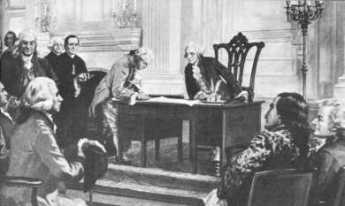
|
| The signing of the Constitution |
In these sentiments, Sir, I agree to this Constitution with all its faults, if they are such; because I think a general Government necessary for us, and there is no form of Government but what may be a blessing to the people if well administered, and believe farther that this is likely to be well administered for a course of years, and can only end in Despotism, as other forms have done before it, when the people shall become so corrupted as to need despotic Government, being incapable of any other. I doubt too whether any other Convention we can obtain may be able to make a better Constitution. For when you assemble a number of men to have the advantage of their joint wisdom, you inevitably assemble with those men, all their prejudices, their passions, their errors of opinion, their local interests, and their selfish views. From such an Assembly can a perfect production be expected? It, therefore, astonishes me, Sir, to find this system approaching so near to perfection as it does; and I think it will astonish our enemies, who are waiting with confidence to hear that our councils are confounded like those of the Builders of Babel; and that our States are on the point of separation, only to meet hereafter for the purpose of cutting one another's throats. Thus I consent, Sir, to this Constitution because I expect no better, and because I am not sure, that it is not the best. The opinions I have had of its error, I sacrifice to the public good--I have never whispered a syllable of them abroad-- Within these walls they were born, and here they shall die--If every one of us in returning to our Constituents were to report the objections he has had to it, and endeavor to gain partisans in support of them, we might prevent it is being generally received, and thereby lose all the salutary effects and great advantages resulting naturally in our favor among foreign Nations as well as among ourselves, from our real or apparent unanimity. Much of the strength and efficiency of any Government in procuring and securing happiness to the people, depends, on opinion, on the general opinion of the goodness of the Government, as well as of the wisdom and integrity of its Governors. I hope therefore that for our own sakes as a part of the people and for the sake of our posterity, we shall act heartily and unanimously in recommending this Constitution (if approved by Congress and confirmed by the Conventions) wherever our influence may extend, and turn our future thoughts and endeavors to the means of having it well administered.
On the whole, Sir, I cannot help expressing a wish that every member of the Convention who may still have objections to it, would with me, on this occasion doubt a little of his own infallibility--and to make manifest our unanimity, put his name to this instrument.
He then moved that the Constitution be signed.
When the last members were signing it, Doctor Franklin looking towards the President's Chair, at the back of which a rising sun happened to be painted, observed to a few members near him, that Painters had found it difficult to distinguish in their art a rising from a setting sun. I have, said he, often and often in the course of the Session, and the vicissitudes of my hopes and fears as to its issues, looked at that behind the President without being able to tell whether it was rising or setting: But now at length I have the happiness to know that it is a rising and not a setting Sun.
WILLIAM BLATHWAYT'S DRAFT OF THE CHARTER OF PENNSYLVANIA
Charles the Second, by the grace of [God] King of England, Scotland, France, and Ireland, Defend[er] of the Faith & Co. To all to whom these presents shall come, greeting.
Whereas our truste[d] and well beloved subject William Penn Esquire, sonne and heire of Sir William Penn, deceased, out of a comendable desire to enlarge our English Empire and promote such usefull comodities as may be of benefit to us and our dominions, as also to reduce the Savage Natives by Gentle and just manners to the Love of civill Society and Christian Religion, hath humbly besought leave of us to transport an ample Colony unto a certaine Country hereinafter described in the parte of America not yet cultivated and planted. And hath likewise humbly besought our Royall Ma[jes]tie to give, grant, and confirme all the said Country with certaine priviledges and Jurisdicions requisite for the good government and safety of the said Country and Colony, to him and his heires for ever. Know yee therefore that wee, favoring the petition and good purpose of the said William Penn, and haveing regard to the memory and merits of his late Father in diverse services and particularly to his conduct, courage, and dircctione {discretion} under our dearest Brother James, Duke of Yorke, in that signall Battle and Victorie fought and obtained against the Dutch Fleet comanded by [illegible word deleted] {The}2 Heer Van Obdam in the yeare 1653. In consideration thereof of our speciall grace, certaine knowledge, and meere motion have given and granted and by this our present Charter for us our heires and successors, doe give and grant unto the said William Penn his heires and Assignes
All that Tract or part of Land of {in}4 America with all the Islands therein contained as the same is bounded on the East by Delaware River from Twelve miles distance Northwards of Newcastle Towne unto the Three and Fortieth degree of Northerne Latitude, If the said River doth extend soe farr northwards. But if the said River shall not extend soe farr northward. then by the said River soe farr as it doth extend, and from the Head of the said River, the Eastern-bounds are to be determined by a Meridian Line to bee drawne from the head of the said River unto the said Three and Fortieth degree; The said Lands {to} extend westward Five degrees in longitude to be computed from the said Eastern bounds, and the said Lands to be bounded on the north by the begining of the Three and Fortieth degree of northerne Latitude and on the South by a Circle drawne of {at}5 12 miles distance from Newcastle northwards6 and westwards, unto the begining of the Fortieth degree of northerne Latitude, and then by a streight line westwards to the limit of Longitude above mentioned7
Wee doe alsoe give and grant unto the said William Penn his heires and Assignes The free and undisturbed use and continuance in and passage into and out of all and singular Ports, Harbours, Bayes, Waters, Rivers, Isles and Inletts belonging unto and {or} leading to and from the Country or Islands aforesaid And all the Soyle, Lands, Feilds, woods, underwoods, mountaines, hills, Fenns, Isles , Lakes, Rivers, Waters, Rivuletts, Bayes, and Inletts scituate or being within or belonging unto the Limitts and bounds aforesaid together with the fishing of all sorts of Fish, whales {sturgeons} and all Royall and other Fishes in the Sea, Bayes, Inletts, waters, or Rivers within the premisses and the Fish therein taken And alsoe all veines Mines and Quarries as well discovered, as not discovered, of gold, silver ,gemms and other {pretious} stones and all other whatsoever bee it of stones, mettalls, or of any other thing or matter whatsoever found or to be found within the Country Isles or limitts aforesaid
And him the said
In Witnesse whereof We have caused these Our Letters to be made Patents, Witness Ourselfe at Westm1 the 4th day of March, In the three and Thirtieth yeare of Our Reigne, 1680/180 Pigott81
Note: Footnotes, edits and insertions from Richard P. Dunn and Mary Maples Dunn, "The Papers of William Penn", U. of PA Press, 1982
Clarifying punctuation and emphasis by George Ross Fisher
Political Parties, Absent and Unmentionable
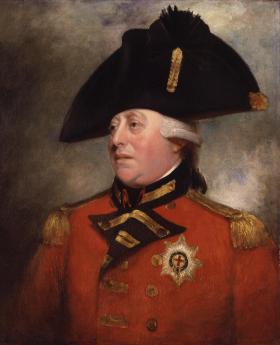
|
| King George III |
BECAUSE America had recently revolted to rid itself of King George III, the Constitutional framers of 1787 sought to construct a government forever free from one-man rule. Inefficiency could be accepted but central dictatorial power, never. It is unrealistic however to expect a wind-up toy to keep working forever, and our Constitution creates the same worry. After two centuries, some chinks have appeared.
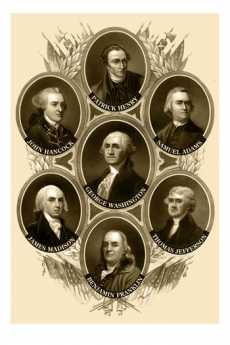
|
| Founding Fathers |
Political parties existed in 18th Century England and Europe, but the American founding fathers seem not to have worried about them much. Within ten years of Constitutional ratification, however, Thomas Jefferson had created a really partisan party which naturally provoked the creation of its partisan opposite. James Madison was slowly won over to the idea this was inevitable, but George Washington never budged. Although they were once firm friends, when Madison's partisan position became clear to him, Washington essentially never spoke to him again. Andrew Jackson, with the guidance of Martin van Buren, carried the partisan idea much further toward its modern characteristics, but it was the two Roosevelts who most fully tested the U.S. Supreme Court's tolerance for concentrating new powers in the Presidency, and Obama who recognized that the quickest way to strengthen the Presidency was to weaken the Legislative branch.
Dramatic episodes of this history are not central to present concerns, which focuses more on the largely unnoticed accumulations of small changes which bring us to our present position. Wars and economic crises induced several presidents, nearly as many Republicans as Democrats, to encourage migrations of power advantage which never quite returned to baseline after each crisis. Primary among these migrations was the erosion of the original assumption of perfect equality among individual members of Congress. A new member of Congress today may tell his constituents he will represent them ably, but when he arrives for work he is figuratively given an office in the basement and allowed to sit on empty packing cases. This is not accidental; the slights are intentional warnings from the true masters of power to bumptious new egotists, they will get nothing in their new environment unless they earn it. Not a bad idea? This schoolyard bullying is a very bad idea. If your elected representative is less powerful, you are less powerful.
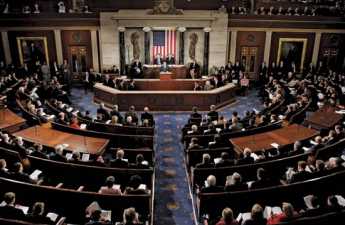
|
| Houses of Congress |
Partisan politics begins with vote-swapping, evolves into a system of concentrating the votes of the members into the hands of party leaders, and ultimately creates the potential for declaring betrayal if the member votes his own mind in defiance of the leader. The rules of the "body" are adopted within moments of the first opening gavel, but they took centuries to evolve and will only significantly change direction on those few occasions when newcomers overpower the old-timers, and only then if some rebel among the old timers takes the considerable trouble to help organize them. In the vast majority of cases, after adoption, the opportunity to change the rules is then effectively lost for two years. Even the Senate, with six-year staggered terms, has argued that it is a "continuing body" and need not reconsider its rules except in the face of a serious uprising on some particular point. Both houses of Congress place great weight on seniority, for the very good purpose of training unfamiliar newcomers in obscure topics, and for the very bad purpose of concentrating power in "safe" districts where party leaders are able to exercise iron control of the nominating process. Those invisible bosses back home in the district, able to control nominations in safe districts, are the real powers in Congress. They indirectly control the offices and chairmanships which accumulate seniority in Congress; anyone who desires to control Congress must control the local political bosses, few of whom ever stand for election to any office if they can avoid it. In most states, the number of safe districts is a function of controlling the gerrymandering process, which takes place every ten years after a census. Therefore, in most states, it is possible to predict the politics of the whole state for a decade, by merely knowing the outcome of the redistricting. The rules for selecting members of the redistricting committee in the state legislatures are quite arcane and almost unbelievably subtle. An inquiring newsman who tries to compile a fifty-state table of the redistricting rules would spend several months doing it, and miss the essential points in a significant number of cases. The newspapers who attempt to pry out the facts of gerrymandering are easily gulled into the misleading belief that a good district is one which is round and compact, leading to a front-page picture showing all districts to be the same physical size. In fact, a good district is one where both parties have a reasonable chance to win, depending for a change, on the quality of their nominee.
So that's how the "Will of Congress" is supposed to work, but the process recently has been far less commendable, and in fact, calls into dispute the whole idea of a balance of power between the three branches of government. We here concentrate on the Health Reform Bill ("Obamacare") and the Financial Reform Bill ("Dodd-Frank"), which send the same procedural message even though they differ widely in their central topic. At the moment, neither of these important pieces of legislation has been fully subject to judicial review, so the U.S. Supreme Court has not yet encumbered itself with stare decisis of its own creation.
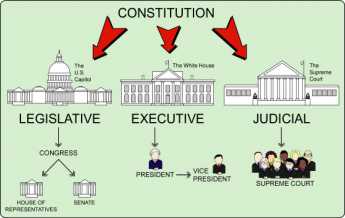
|
| Three branches of government |
In both cases, bills of several thousand pages each were first written by persons who if not unknown, are largely unidentified. It is thus not yet possible to determine whether the authors were affiliated with the Executive Branch or the Legislative one; it is not even possible to be sure they were either elected or appointed to their positions. From all appearances, however, they met and organized their work fairly exclusively within the oversight of the Executive Branch. Some weighty members of the majority party in Congress must have had some involvement, but it seems a near certainty that no members of the minority party were included, and even comparatively few members of highly contested districts, the so-called "Blue Dogs" of the majority party. It seems safe to conjecture that a substantial number either represent special interest affiliates or else party faithful from safe districts with seniority. The construction of the massive legislation was conducted in such secrecy that even the sympathetic members of the press were excluded, and it would not be surprising to learn that no person alive had read the whole bill carefully before it was "sent" to Congress. It's fair to surmise that no member of Congress except a few limited members of the power elite of the majority party were allowed to read more than scattered fragments of the pending legislation in time to make meaningful changes.
The next step was probably more carefully managed. No matter who wrote it or what it said, a majority of the relevant committees of both houses of Congress had to sign their names as responsible for approving it. Because of the relatively new phenomenon of live national televising of committee procedure, the nation was treated to the sight of congressmen of both parties howling that they were only given a single day to read several thousand pages of previously secret material -- before being forced to sign approval of it by application of unmentioned pressures enabled by the rules of "the body". When party members in contested districts protested that they would be dis-elected for doing so, it does not take much imagination to surmise that they were offered various appointive offices within the bureaucracy as a consolation. As it turned out, the legislation was only passed narrowly on a straight-party vote, so there can be a considerable possibility of its likely failure if the corruptions of politics had been set aside, with members voting on the merits. Nevertheless, since this degree of political hammering did result in a straight-party vote, it leaves the minority party free to overturn the legislation when it can. The prospect of preventing an overturn in succeeding congresses seems to be premised on "fixing" flaws in the legislation through the issuance of regulations before elections can open the way to overturn of the underlying authorization. Legislative overturn, however, is very likely to encounter filibuster in the Senate, which presently requires 40 votes. Even that conventional pathway is booby-trapped in the case of the Dodd-Frank Law. The Economist magazine of London assigned a reporter to read the entire act, and relates that almost every page of it mandates that the Executive Branch ("The Secretary shall") must take rather vague instructions to write regulations five or ten times as long as the Congressional authorization, giving the specifics of the law. The prospect looms of vast numbers of regulations with the force of law but written by the executive branch, emerging long after the Supreme Court considers the central points, years after the authorizing congressmen have had a chance to read it, and well after the public has rendered final judgment with a presidential election. The underlying principle of this legislation is the hope that it will later seem too disruptive to change a law, even though most of it was never considered by the public or its representatives.
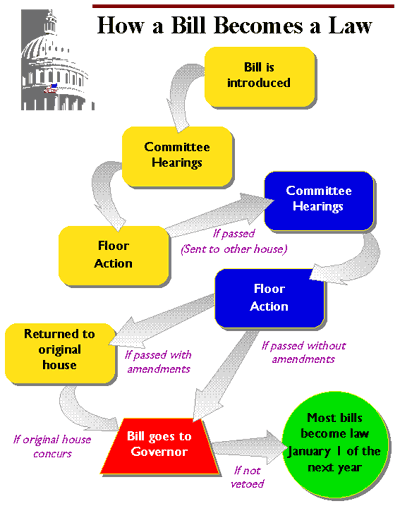
|
| Bill become a Law |
The "regulatory process" takes place entirely within the Executive branch. Congress passes what it terms "enabling" legislation, containing language to the effect that the Cabinet Secretary shall investigate as needed, decide as needed, and implement as needed, such regulations as shall be needed to carry out the "Will" of Congress. Since the regulations for two-thousand-page bills will almost certainly run to twenty thousand pages of regulations with the force of law, the enabling committee of Congress will be confronted with an impossible task of oversight, and thus will offer few objections. The Appropriations Committees of Congress, on the other hand, are charged with reviewing every government program every year and have the power to throttle what they disapprove of, by the simple mechanism of cutting off the program's funds. Members of the coveted Appropriations Committees are appointed by seniority, come from safe districts, and are attracted to the work by the associated ability to bestow plums on their home districts. By the nature of their appointment process, unworried by the folks back home but entirely beholden to the party bosses, they have the latitude to throttle anything the leadership of their party wants to throttle badly enough. The outcome of such take-no-prisoners warfare is not likely to improve the welfare of the nation, and therefore it is rare that partisan politics are allowed to go so far.
The three branches of government have become unbalanced. These bills were almost entirely written outside of the Legislative branch, and the ensuing regulations will be written in the Executive branch. The founding fathers certainly never envisioned that sweeping modification will be made in the medical industry and the financial industry, against the wishes of these industries, and in any event without convincing proof that the public is in favor. This is what is fundamentally wrong about taking such important decisions out of the hands of Congress; it threatens to put the public at odds with its government.
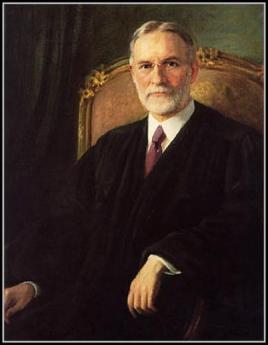
|
| Justice George Sutherland |
There is no need to go further than this, harsher words will only inflame the reaction further than necessary to justify a pull-back. And yet, the Supreme Court would do us mercy if it doused these flames; the Supreme Court needs a legal pretext. May we suggest that Justice George Sutherland, who sat on the court seventy years ago, may have sensed the direction of things, short of using a particular word. Justice Sutherland recognized that although it is impractical to waver from the principle that ignorance of the law is no excuse, it is entirely possible for a person of ordinary understanding to read law in its entirety and still be confused as to its intent. He thus created a legal principle that a law may be void if it is too vague to be understood. In particular, a common criminal may be even less able to make a serious analysis. Therefore, at least in criminal cases, a lawyer may well be void for vagueness. In this case, we are not speaking of criminals as defendants or civil cases of alleged damage of one party by a defendant. Here, it is the law itself which gives offense by its vagueness, and Congress which created the vagueness is the defendant. Since we have just gone to considerable length to describe the manner in which Congress is possibly the main victim, this situation may be one of the few remaining ones where a Court of Equity is needed. That is, an obvious wrong needs to be corrected, but no statute seems to cover the matter. The Supreme Court might give some thought to convening itself as a special Court of Equity, on the special point of whether this legislation is void for vagueness.
We indicated earlier that one word was missing in this bill of particulars. That would be needed, to expand the charge to void for intentional vagueness, an assessment which is unflinchingly direct. It suggests that somewhere in at least this year's contentious processes, either the Executive Branch or the officers of the congressional majority party, or both, intended to achieve the latitude of imprecision, that is, to do as it pleased. Anyone who supposes the general run of congressmen voluntarily surrendered such latitude in the Health and Finance legislation, has not been watching much television. Given the present vast quantity of annually proposed legislation, roughly 25,000 bills each session, the passage of a small amount of vague legislation might only justify voiding individual laws, whereas an undue amount of it might additionally justify a reprimand. However, engineering laws which are deliberately vague might rise to the level of impeachment.
Franklin Teaches Investing to Boston and Philadelphia
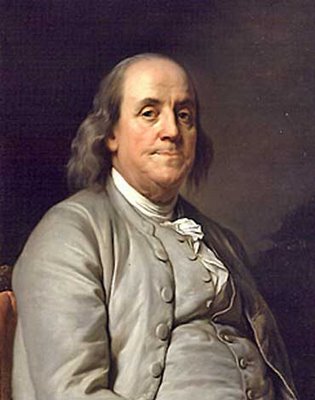
|
| Benjamin Franklin |
CODICIL: I, Benjamin Franklin, in the foregoing or annexed last will and testament named, having further considered the same, do think proper to make and publish the following codicil or addition thereto.
It has long been a fixed political opinion of mine, that in a democratical state there ought to be no offices of profit, for the reasons I had given in an article of my drawing in our constitution, it was my intention when I accepted the office of President, to devote the appointed salary to some public uses. Accordingly, I had already, before I made my will in July last, given large sums of it to colleges, schools, the building of churches, etc.; and in that will I bequeathed two thousand pounds more to the State for the purpose of making the Schuylkill navigable. But understanding since that such a work, and that the project is not likely to be undertaken for many years to come, and having entertained another idea, that I hope may be more extensively useful, I do hereby revoke and annul that bequest, and direct that the certificates I have for what remains due to me of that salary be sold, towards raising the sum of two thousand pounds sterling, to be disposed of as I am now about to order.
It has been an opinion, that he who receives an estate from his ancestors is under some kind of obligation to transmit the same to their posterity. This obligation does not lie on me, who never inherited a shilling from an ancestor or relation. I shall, however, if it is not diminished by some accident before my death, leave a considerable estate among my descendants and relations. The above observation is made as merely as some apology to my family for making bequests that do not appear to have any immediate relation to their advantage.
I was born in Boston, New England, and owe my first instructions in literature to the free grammar schools established there. I have, therefore, already considered these schools in my will. But I am also under obligations to the State of Massachusetts for having, unasked, appointed me formerly their agent in England, with a handsome salary, which continued some years; and although I accidentally lost in their service, by transmitting Governor Hutchinson's letters, much more than the amount of what they gave me, I do not think that ought in the least to diminish my gratitude.
I have considered that, among artisans, good apprentices are most likely to make good citizens, and, having myself been bred to a manual art, printing, in my native town, and afterward assisted to set up my business in Philadelphia by kind loans of money from two friends there, which was the foundation of my fortune, and all the utility in life that may be ascribed to me, I wish to be useful even after my death, if possible, in forming and advancing other young men, that may be serviceable to their country in both these towns. To this end, I devote two thousand pounds sterling, of which I give one thousand thereof to the inhabitants of the town of Boston, in Massachusetts, and the other thousand to the inhabitants of the city of Philadelphia, in trust, to and for the uses, intents, and purposes hereinafter mentioned and declared.
The said sum of one thousand pounds sterling, if accepted by the inhabitants of the town of Boston, shall be managed under the direction of the selectmen, united with the ministers of the oldest Episcopalians, Congregational, and Presbyterian churches in that town, who are to let out the sum upon interest, at five per cent, per annum, to such young married artificers, under the age of twenty-five years, as have served an apprenticeship in the said town, and faithfully fulfilled the duties required in their indentures, so as to obtain a good moral character from at least two respectable citizens, who are willing to become their sureties, in a bond with the applicants, for the repayment of the moneys so lent, with interest, according to the terms hereinafter prescribed; all which bonds are to be taken for Spanish milled dollars, or the value thereof in current gold coin; and the managers shall keep a bound book or books, wherein shall be entered the names of those who shall apply for and receive the benefits of this institution, and of their sureties, together with the sums lent, the dates, and other necessary and proper records respecting the business and concerns of this institution. And as these loans are intended to assist young married artificers in setting up their business, they are to be proportioned by the discretion of the managers, so as not to exceed sixty pounds sterling to one person, nor to be less than fifteen pounds; and if the number of appliers so entitled should be so large as that the sum will not suffice to afford to each as much as might otherwise not be improper, the proportion to each shall be diminished so as to afford to everyone some assistance. These aids may, therefore, be small at first, but, as the capital increases by the accumulated interest, they will be ampler. And in order to serve as many as possible in their turn, as well as to make the repayment of the principal borrowed easier, each borrower shall be obliged to pay, with the yearly interest, one-tenth part of the principal and interest, so paid in, shall be again let out to fresh borrowers.
And, as it is presumed that there will always be found in Boston virtuous and benevolent citizens, willing to bestow a part of their time in doing good to the rising generation, by superintending and managing this institution gratis, it is hoped that no part of the money will at any time be dead, or be diverted to other purposes, but be continually augmenting by the interest; in which case there may, in time, be more than the occasions in Boston shall require, and then some may be spared to the neighboring or other towns in the said State of Massachusetts, who may desire to have it; such towns engaging to pay punctually the interest and the portions of the principal, annually, to the inhabitants of the town of Boston.
If this plan is executed, and succeeds as projected without interruption for one hundred years, the sum will then be one hundred and thirty-one thousand pounds; of which I would have the managers of the donation to the town of Boston then lay out, at their discretion, one hundred thousand pounds in public works, which may be judged of most general utility to the inhabitants, such as fortifications, bridges, aqueducts, public buildings, baths, pavements, or whatever may make living in the town more convenient to its people, and render it more agreeable to strangers resorting thither for health or a temporary residence. The remaining thirty-one thousand pounds I would have continued to be let out on interest, in the manner above directed, for another hundred years, as I hope it will have been found that the institution has had a good effect on the conduct of youth, and been of service to many worthy characters and useful citizens. At the end of this second term, if no unfortunate accident has prevented the operation, the sum will be four million and sixty-one thousand pounds sterling, of which I leave one million sixty-one thousand pounds to the disposition of the inhabitants of the town of Boston, and three millions to the disposition of the government of the state, not presuming to carry my views farther.
All the directions herein given, respecting the disposition and management of the donation to the inhabitants of Boston, I would have observed respecting that to the inhabitants of Philadelphia, only, as Philadelphia is incorporated, I request the corporation of that city to undertake the management agreeably to the said directions; and I do hereby vest them with full and ample powers for that purpose. And, having considered that the covering a ground plot with buildings and pavements, which carry off most of the rain and prevent its soaking into the Earth and renewing and purifying the Springs, whence the water of wells must gradually grow worse, and in time be unfit for use, as I find has happened in all old cities, I recommend that at the end of the first hundred years, if not done before, the corporation of the city Employ a part of the hundred thousand pounds in bringing, by pipes, the water of Wissahickon Creek into the town, so as to supply the inhabitants, which I apprehend may be done without great difficulty, the level of the creek is much above that of the city, and may be made higher by a dam. I also recommend making the Schuylkill completely navigable. At the end of the second hundred years, I would have the disposition of the four million and sixty-one thousand pounds divided between the inhabitants of the city of Philadelphia and the government of Pennsylvania, in the same manner as herein directed with respect to that of the inhabitants of Boston and the government of Massachusetts.
It is my desire that this institution should take place and begin to operate within one year after my decease, for which purpose due notice should be publicly given previous to the expiration of that year, that those for whose benefit this establishment is intended may make their respective applications. And I hereby direct my executors, the survivors or survivor of them, within six months after my decease, to pay over the sum of two thousand pounds sterling to such persons as shall be duly appointed by the Selectmen of Boston and the corporation of Philadelphia, to receive and take charge of their respective sums, of one thousand pounds each, for the purposes aforesaid.
Considering the accidents to which all human affairs and projects are subject in such a length of time, I have, perhaps, too much flattered myself with a vain fancy that these dispositions, if carried into execution, will be continued without interruption and have the effects proposed. I hope, however, that if the inhabitants of the two cities should not think fit to undertake the execution, they will, at least, accept the offer of these donations as a mark of my good will, a token of my gratitude, and a testimony of my earnest desire to be useful to them after my departure.
I wish, indeed, that they may both undertake to endeavor the execution of the project, because I think that, though unforeseen difficulties may arise, expedients will be found to remove them, and the scheme be found practicable. If one of them accepts the money, with the conditions, and the other refuses, my will then is, that both Sums be given to the inhabitants of the city accepting the whole, to be applied to the same purposes, and under the same regulations directed for the separate parts; and, if both refuse, the money, of course, remains in the mass of my Estate, and is to be disposed of therewith according to my will made the Seventeenth day of July, 1788.
..........................................................And lastly, it is my desire that this, my present codicil, be annexed to, and considered as part of, my last will and testament to all intents and purposes.
In witness whereof, I have hereunto set my hand and Seal this twenty-third day of June, Anno Domini one thousand Seven hundred and eighty-nine.
B. Franklin.
Sad Aftermath
Extracted from a printed Report of the Committee of Legacies and Trusts, made in the Common Council of Philadelphia April 27th, 1837, by Mr. John Thomason, chairman of the Committee.
"From official returns, it appears, that up to the 1st of January, 1837, the fund has been borrowed by one hundred and ninety-three individuals, in sums mostly of $ 260 each. At that date, the fund was in the hands of one hundred and twelve beneficiaries, of whom nineteen have paid neither principal nor interest, although the accounts of some of them have been open for a period of thirty-four years. Ninety other persons stand indebted in sums from $ 21 to $ 292; and three, having borrowed within the year, were not, at the last-mentioned date, liable to any demand by the trustees. Of these one hundred and nine cases of non-compliance with the terms of the will, fifty-eight bonds may be subject to a plea of the statute of limitation, and the rest is still valid. In this condition of the fund, it becomes difficult to estimate its present value. Should all the debts be recovered, the amount of the fund would be $ 23,627.09; but, from the length of time elapsed since the date of many of those bonds, such a result is hopeless; and even this latter sum, large as it is, is below the amount it would have attained at this time had the intentions of the testator been fully carried out. The original bequest of $4,444.44, at compound interest for forty-five years, would be $ 39,833.29 ; and, although the immediate conversion of interest into principal, as the former becomes due, is not always practical, yet it is believed, that, with careful management, the fund would, at this time, have lacked but little of that amount. How far the fund falls short, may be partly judged from the actual receipts on account of this legacy for the last ten years. During that time the sum of $ 16,191.92 has been paid in. As this period included the term for lending out, and receiving back with interest, the whole fund, the receipts within that term may be taken as a safe approximation to its real value; to which must be added the sum to be obtained through the enforcing of payment, by legal process, from such securities as may be good at this late day. Had the fund been placed at simple interest, it would have amounted to the last-mentioned sum by this time.
"Had the requirements of the will been, in former years, fully complied with, the operation of the fund, at this day, would be sensibly felt by the mechanics of Philadelphia. Passing from one borrower to another, and increasing in a compound ratio, its effect would be to stimulate useful industry, which, without such capital, would have remained unproductive. It would have increased the number of those who do business on their own stock. It would be a standing lesson on the immutable connexion between capital and productive industry, thus constantly inciting to economy and prudence. It would have become the reward of every faithful apprentice, who could look forward to a participation in its benefit. It is deeply to be regretted, that this state of things, which had so captivated the imagination of Franklin that he devoted a portion of his hard-earned wealth to realize it for the mechanics of Philadelphia, should, in the emphatic language of his will, prove 'a vain fancy. ' "
By this statement it would seem, that there had been at some time a remarkable want of fidelity in administering the trust, especially in allowing so large a number of bonds to become worthless by the statute of limitation, and neglecting to make reasonable- demands upon the sureties.
Appended to the same report is a letter from Mr. William Minot, treasurer of the Franklin Fund in Boston, dated December 23d, 1836, which contains the following state, of the fund in that city.
"The whole number of loans from this Fund," Mr. Minot says, " from May 1791 to the present time, has been 255, in sums varying from 70 to $ 266 up to the year 1800, since which time they have usually been 200.
"From July, 1811, to the present time, the number of loans has been 91, of which 50, at least have been repaid (in whole or in part) by sureties, and on four of these are balances which cannot be collected, both principals and sureties being insolvent.
" Dr. Franklin's donation was Pound 1,000 sterling. The present value of the Fund is as follows;
"Estimate of 13 bonds, considered good, 1,428.68 "Amount deposited, on interest, in the office of the Massachusetts Hospital Life Insurance Company, 22,739.00 Cash in the hands of the Treasurer 158.15
$24,325.83
"It is apparent, from these facts, that the benevolent intentions of the donor have not been realized, and that, in the present condition of our country, it is not advantageous to married mechanics, under the age of twenty-four years, to borrow money to be repaid in easy installments, at a low rate of interest; and the improvidence of early marriages, among that class of men, may fairly be inferred.
"The great number of instances, in which sureties have been obliged to pay the loans, has rendered it not so easy, as formerly, for applicants to obtain the required security. This is proved by the small number of loans from the fund, averaging for the last five years, not more than one a year.
"Until within the last twenty years, no great care was taken in accumulating the fund. It is now carefully attended to; and money not required for actual use is placed in the Life Insurance Company, where it increases at the rate of about five and one-third percent a year.
"The loans are made at the rate of five percent, but, on installments past due, six percent is charged, from the time they were payable, and the bonds of delinquents are put in a suit after reasonable notice. Two sureties, at least, are required on each bond."
According to the treasurer's return on a lot of January 1840, the amount of the fund in Boston was at that time as follows.
Deposited in the Life Insurance office, 26,595.64
Bonds for Loans 1,846.35 $28,441.99
Net Neutrality and Vertical Integration

|
| Late Hour Calls |
My fancy new cell phone has an annoying habit of ringing a bell every time an e-mail arrives, which is a little puzzling when it rings in the middle of the night. The email program displays time of arrival, so after a while, I took the trouble to see who was emailing me at 4 AM. It seems to be spam and other commercial programs, but it is also an occasional letter with a large attachment, which had been sent several hours earlier. At this, a light began to go on in my head.
I had been told the internet measures the size of files and puts big ones at the end of the queue. That seemed to explain the occasionally delayed transmission of ultra-large emails at times of heavy internet traffic. And it brings up the issue of net neutrality. If the traffic in large files grows enough, it might eventually clog the wires and bring things to a halt. The internet providers would have to spend money to build additional capacity, and it only seems fair to charge big users more for the costs they have created. That would seem a reasonable technological argument for allowing the networks to impose differential pricing, and for overturning the idea of net neutrality.

|
| Comcast and NBC |
Unfortunately, it might or might not be a sincere argument for resisting net neutrality, since there are major commercial issues at stake as well. For example, Comcast is trying to purchase NBC; its motives are clarified by remembering that a few years ago it tried to purchase Walt Disney. In both cases, a common carrier would be acquiring a "content provider", and thus acquiring a competitive advantage over competitive internet network providers who lack a captive source of content. A strong temptation would exist to slant the internet charges to the disadvantage of other competitors, thus providing a motive to get involved in insincere arguments about net neutrality. What we seem to have here is a familiar antitrust legal doctrine of "vertical integration". For years, vertical integration was prohibited, but the U.S. Supreme Court reversed that prohibition a few years ago, in the case of State Oil v. Kahn. Lewis van Dusen and I had been in the audience of the State Oil arguments, because of our interest in the implications of vertical integration for the medical profession (doctors versus hospitals, for example).
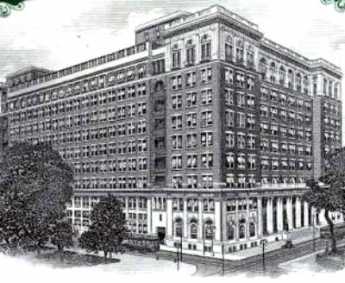
|
| Curtis Publishing |
Although the example of Curtis Publishing was not introduced into the arguments of State Oil versus Kahn, it was much in my mind and might well have been used effectively to demonstrate the vulnerability of any corporation which attempts to become vertically integrated by purchasing its suppliers and/or distributors. Curtis Publishing, a few blocks from my office, had been a successful magazine publisher, so successful that it had enough profits to buy Canadian forests to use for paper pulp in its magazines. The outcome was the bankruptcy of the profitable magazine company when the paper pulp business fell on hard times. No antitrust action to prohibit vertical integration was necessary; the dismal fate of Curtis and similar integrators stood as an effective restraint on anyone else who was tempted to get into the vertical integration business. That may be a little hard to follow, and it took the Supreme Court many years to get to that point. But the fact remains that vertical integration is no longer illegal because it is effectively restrained by recognition of its dangers.
So, if we are getting into the insincere argument business, it is time for someone to put his arm around the shoulders of Comcast. Let's whisper that avoidance of the net neutrality dispute is kindly advice, offered solely for Comcast's own good.

|
| Comcast Center |
And, having gone this far in poking into other people's business, there might be some value in giving some advice to the antitrust lawyers. This sort of case can take years, even decades, to evolve through the legal system. And while its resolution will be phrased in legal terms, I'm not so sure that's sincere, either. It takes me back to the IBM case, where one of the junior lawyers was courting one of my daughters. This young fellow sat for months in front of a microphone at a deposition, doing nothing but read documents into the record. Although he was handsomely paid, the lawyer finally got so sick of the boring futility of dictating a mountain of transcript no one would ever read, into a microphone in an empty room, that he quit. And in the opinion of observers on the courthouse steps, the case was finally determined by the Judge's decision that the patent infringement business was trivial compared with the fact that IBM was mass-producing the greatest innovation of the century -- and the patent-infringement people were just getting in the road.
That may or may not have been the case, but it raises the question of whether antitrust law is wisely based when it considers, not the welfare of competitors, but the strength and vitality of competition itself. What might thus be considered paramount, and perhaps occasionally is so, is the economic welfare of the nation. At present, the newspapers regard this issue as a fight between Netflix and Comcast, and so are now free to devote news attention to other matters. I don't think so. I believe it directly challenges the operation of the Law, which contends that vertical integration eventually takes care of itself. To me, that is only true if circumstances give us enough time to wait it out. In the long run, as Maynard Keynes quipped, we are all dead.
Do Computers Thrive on Lead Poisoning?

|
| Get the Lead Out |
At a local outlet of a well-known chain of computer stores, the geek told me that small computer towers don't last as long as big-box desktops, perhaps only three years compared with the old five-year lifespan. And that's because they get hotter. Which is because they run faster than they used to, and also because a federal regulation prohibiting the use of lead in soldering joints makes the wiring wear out sooner. By the time he was done explaining things to me, I was ready to run out and join the local political Tea Party. Because I don't think it's very likely that toddler children will be eating my solder very soon, or even ever. And indeed, I have trouble imagining any children anywhere in the world ever nibbling on computer innards, even once. Maybe the concern is that the heat will vaporize the lead, and little children crawling on the floor will inhale the lead vapor, getting lead poisoning that way. While that may be somewhat more plausible than eating computer parts, or eating vegetables grown in the neighborhood of trash disposal, or breathing the air full of lead fumes -- it doesn't really seem very plausible at all.
It is generally reckoned that 835 million computers worldwide were manufactured in 2010. If they cost an average of $500 apiece and lasted 40% less long than if they used lead solder, the world would end up buying 300 million additional computers per year, conservatively spending $1.5 billion more dollars a year to do so. Are the dangers of lead poisoning so threatening that such a cost is justified on a hypothetical basis? The people who do the soldering are possibly at somewhat greater risk, but you could buy a lot of masks and air purifiers for the extra cost for computers alone. Can this possibly be true?
Is it possible that the geek in the computer store is just selling warranty insurance, or more expensive computers when he passes on this news? Is it possible that the makers of fumes ventilators are promoting their products in this way? How about the plaintiff trial lawyers. Are they calculating that frenzied citizens will wander into jury duty and be concerned to punish the evil makers of computers with gigantic penalties, of which the lawyers will get 40%? Or the makers of cool computer boxes are competing indirectly with the evil makers of hot computer boxes?
This article ends with a comment section. Those who can offer references to the facts, in this case, are urged to send them in. Something in this story doesn't stand the light of day, and perhaps a way can be found to shine a little light of day on the facts.
Adrift With The Living Constitution
.jpg)
|
| Senator Joe Sestak |
Former Congressman Joe Sestak visited the Franklin Inn Club recently, describing his experiences with the Tea Party movement. Since Senator Patrick Toomey, the man who defeated him in the 2010 election, is mostly a Libertarian, and Senator Arlen Specter who also lost has switched parties twice, all three candidates in the Pennsylvania senatorial election displayed major independence from party dominance, although in different ways. Ordinarily, gerrymandering and political machine politics result in a great many "safe" seats, where a representative or a Senator has more to fear from rivals in his own party than from his opposition in the other party; this year, things seem to be changing in our area. Pennsylvania is somehow in the vanguard of a major national shift in party politics, although it is unclear whether a third party is about to emerge, or whether the nature of the two party system is about to change in some other way.
For his part, Joe Sestak (formerly D. Representative from Delaware County) had won the Democratic senatorial nomination against the wishes of the party leaders, who had previously promised the nomination to incumbent Senator Specter in reward for Specter's switching from the Republican to Democratic party. For Vice-Admiral Sestak, USN (Ret.) it naturally stings a little that he won the nomination without leadership support, but still came reasonably close to winning the general election without much enthusiasm within his party. He clearly believes he would have beaten Toomey if the party leaders had supported him. It rather looks as though the Democratic party leadership would rather lose the election to the Republicans than lose control of nominations, which are their real source of power. Controlling nominations is largely a process of persuading unwelcome contenders to drop out of the contest. Sestak is, therefore, making a large number of thank-you visits after the election, and clearly has his ears open for signs of what the wandering electorate might think of his future candidacy.
America clearly prefers a two-party system to both the dictatorial tendencies of a one-party system, as well as to European multi-party arrangements, such as run-offs or coalitions. A two-party system blunts the edges of extreme partisanship, eventually moving toward moderate candidates in the middle, in order to win a winner-take-all election. Therefore, our winner-take-all rules are the enforcement mechanism for a two-party system. Our deals and bargains are made in advance of the election, where the public can express an opinion. In multi-party systems, the deals are made after the election where the public can't see what's going on, and such arrangements are historically unstable, sometimes resulting in a victory by a minority fringe with violently unpopular policies. In our system, a new third-party mainly serves as a mechanism for breaking up one of the major parties, to reformulate it as a two-party system with different composition. Proportional representation is defended by European politicians as something which promotes "fairness". Unfortunately, it's pretty hard to find anything in politics anywhere which is sincerely devoted to fairness.
Going far back in history one of the great theorists of legislative politics was the Roman Senator Pliny the Younger, who wrote books in Latin about how to manipulate a voting system. For him, parties were only temporary working arrangements about individual issues, a situation where he recommended: "insincere voting" as a method for winning a vote even if you lacked a majority in favor of it. Over the centuries, other forms of party coalitions have emerged in nations attempting to make democracy workable. Indeed, a "republic" itself can be seen as a mechanism devised for retaining popular control in an electorate grown too large for the chaos and unworkability of pure town hall democracy. A republic is a democracy which has been somewhat modified to make it workable. Our founding fathers knew this from personal experience, and never really considered pure democracy even in the Eighteenth century.
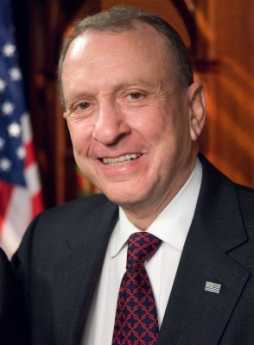
|
| Senator Specter |
The two main actors in shaping the American Republic were George Washington and James Madison. Madison was young, scholarly and largely unknown; Washington was old, famous, and insecure about his lack of academic political education. Both of them knew very well that if Washington really wanted something he was going to have it; what mainly restrained him was fear of looking foolish. But he hated partisanship and conniving, partly as a result of having been the victim of General Mifflin and the Conway Cabal. Washington hated political parties and anything resembling them; Madison was young and uncertain, and briefly surrendered the point. It took about two years of real-life governing for Madison to conclude that political parties were absolutely essential to getting something accomplished. In this, he experienced for the first time those unwelcome "pressures from the home state", with Thomas Jefferson determined to thwart Alexander Hamilton, and Patrick Henry thundering and denouncing any hesitation in going for the jugular vein of opponents. Madison was deeply concerned with making his new nation success and eventually joined Jefferson in the Virginia policy of opposing banks, cities and manufacturing. When Washington saw that Madison was committed to this course, he never spoke to him again. For Washington, honesty was always the best policy, and personal honor is never regained once it is lost. The compromise of 1790 was particularly vexing to their relationship, when Washington's honor and personal finances were used as bargaining chips for moving the nation's capital opposite Mount Vernon on the Potomac River, in return for placating Hamilton and Robert Morris with the assumption of state revolutionary war debts.
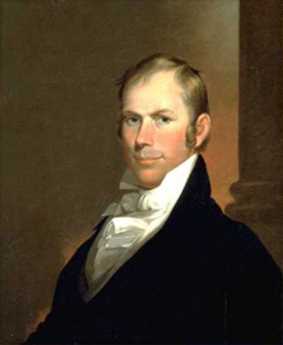
|
| Henry Clay 1811 |
Legislative partisan politics took a violent turn in 1811 when 34-year old Henry Clay was elected to his first term as a member of the House of Representatives. The Senate was less prestigious than the House in those days, and Clay had spent his time as a senator studying the landscape of the House before he made his big move upward. Up until that moment, the role of Speaker was that of mediator and administrator of the rules, partisanship was considered a shameful thing in a Speaker. Young Clay was elected Speaker on the first day of the first session after he moved to the House as a member. Seniority was brushed aside, and this newcomer took over. It takes only a moment's reflection to surmise that a lot of politics had taken place before the House convened. Not only that, but Clay immediately added the power of the Speaker to appoint committee chairmen, to the invisible powers of majority leader. The office of majority leader had not yet been created, but it was not long in emerging that anyone who could assemble enough votes for Speaker was also able to make highly partisan choices for Committee Chairs. Eventually, the seniority system was imposed in part as a reaction to perceived abuses of Speaker power. It is worth a digression to reflect on the role of any seniority system, which as it is clearly seen in labor-management industrial relations, serves to deprive management of promotion power, usually substituting seniority for selection by merit. In the case of the Speaker, the seniority system catapults the power of the Speaker over that of every member of his caucus. To rise in a seniority system for committee chairmen, a member must first be appointed to a desirable committee -- by the Speaker, or by his instructed favorites on the appointment committee. It puts in the hands of the Speaker or his agents the power to humiliate a member by ignoring his seniority; the other members know immediately what that means. To understand the power of this threat, reflect on Woodrow Wilson's famous observation that "Congress in committee, is Congress at work."
Soon after Henry Clay made his dramatic moves, Martin van Buren extended the idea of partisan party politics to the actual election of Congressmen. Much of the hoopla and deceptiveness of subsequent campaigns was invented by Andrew Jackson's vice president. And that included their own deal, in which van Buren worked for Jackson's election in return for a promise that he would be the successor, President. After that came the election of 1848, in which William Henry Harrison was elected as a man born in a log cabin. When, in fact, he had been born in one of the largest mansions in Virginia. That had been approximately George Washington's residence description, too, but it is hard to see Old Stone Face lowering himself to accept any office unless it was offered unanimously.
Compare that with the campaign financing episode which created the urban political machine. The Philadelphia traction king Wm. L. Elkins was narrowly concerned with building streetcar lines along with his business associate P.A.B. Widener; Widener had been a city politician before he got into street cars. One or the other of these two approached the Mayor of Philadelphia with the complaint that it interfered with building streetcar lines to have to bribe every bartender on every street corner. So he made a proposal. It wasn't the money that bothered him, because he could just raise trolley fares to cover it, it was the protracted delays. So, how would it be if the trolley company just delivered a big lump-sum bribe to the mayor? That would give enormous political power to the party boss through the power to distribute or withhold the boodle to party workers. And it would save the trolley company lots of time, while not costing any more than the "retail graft" system. Since then, just about every urban political machine in the country has been largely financed through the macing of utilities.
The downward trend of serial modifications to the Philadelphia Constitution of 1787, should be clear enough without further illustration. If the Tea Parties aren't mad about it, they should be. More likely, however, they are mainly mad about the modern pinnacle of sly tinkerings, plainly displayed on TV during the enactment of the Obama Health Bill. The point was repeated for emphasis in the Dodd-Frank financial bill, in case it is ever claimed to have been accidental. In both cases, 2000 page bills were prepared out of sight and thrust before the Congress with orders to enact them in four hours. If that's a representative government, perhaps we ought to go back to having a King.
Fort Wilson: Philadelphia 1779
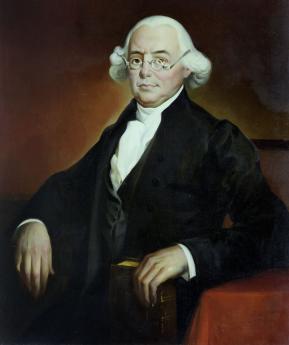
|
| James Wilson |
OCTOBER 4, 1779. The British had conquered then abandoned Philadelphia; an order was still only partially restored. Joseph Reed was President of the Continental Congress, inflation ("Not worth a Continental") was rampant, and food shortages were at near-famine levels because of self-defeating price controls. In a world turned upside down, Charles Willson Peale the painter was a leader of a radical group of admirers of Rousseau the French anarchist, called the Constitutionalist Party, leaning in the bloody direction actually followed by the French Revolution in 1789. Peale was quick to admit he had no clue what to do with his leadership position and soon resigned it in favor of painting portraits of the wealthy. Others had deserted the occupied city, and many had not yet returned. The Quakers of the city hunkered down, more or less adhering to earlier instruction from the London Yearly Meeting to stay away from any politics involving war taxes. About two hundred militia roamed the city streets making trouble for anyone they could plausibly blame for the breakdown of civil order. Philadelphia was as close to anarchy as it would ever become; the focus of anger was against the pacifist Quakers, the rich merchants, and James Wilson the lawyer.
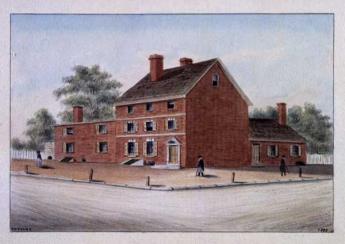
|
| Fort Wilson |
Wilson had enraged the radicals by defending Tories in court, much as John Adams got in trouble for defending British troops involved in the Boston Massacre; Ben Franklin advised Wilson to leave town. It is still possible to walk the full extent of the battle of Fort Wilson in a few minutes, and the tourist bureau has marked it out. Begin with the Quaker Meeting at Fourth and Arch. A few wandering militiamen caught Jonathan Drinker, Thomas Story, Buckridge Sims, and Matthew Johns emerging from the Quaker church, and rounded them up as prisoners. The Quakers were marched down the street for uncertain purposes when the militia encountered a group of prominent merchants emerging from the City Tavern. Unlike the meek Quakers, Robert Morris and John Cadwalader the leader of the City Troop ordered the militia to release the prisoners, behave themselves, and disperse; Timothy Matlack shouted orders. It was exactly the wrong stance to take, and about thirty prominent citizens were soon driven to retreat to the large brick house of James Wilson, at the corner of Third and Walnut, known forever afterward as Fort Wilson. Doors were barred, windows manned, and Fort Wilson was soon surrounded by an armed, shouting, mob. Lieutenant Robert Campbell leaned out a third story window and was soon dropped dead by a lucky bullet. It remains in dispute whether or not he fired first. Crowbars were sought, the back door forced open, but the angry attackers scattered after fusillades from inside.
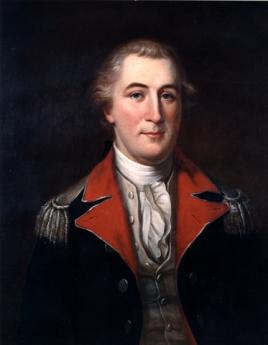
|
| Joseph Reed |
Down the street came President Reed on horseback, ordering the militia to disperse, with Timothy Matlack at his side; both men were well-known radicals, here switching sides to maintain law and order. The City Troop arrived, an order was given the cavalry to Assault Every Armed Man. The radicals were finally dispersed by this makeshift cavalry charge, cutting and slashing its way through the dazed militia. When it was over, five defenders were dead and about twenty wounded. Among the militia, the casualties were heavier but inaccurately reported. Robert Morris took James Wilson in hand and retreated to his mansion at Lemon Hill; Wilson was the founder of America's first law school. Among other defenders huddled in Fort Wilson were some of the future framers of the Constitution from Pennsylvania: General Thomas Mifflin, Wilson, Morris, George Clymer. Equally important was the deep impression left on radical leaders like Reed and Matlack, and Henry Laurens, who could see how close the whole war effort was to dissolution, for lack of firm control. Inflation continued but the center-productive price control system was abandoned and never revived; the Patriots had a bad scare, and the heedless radicals forced to confront the potentially disastrous consequences of their own amateur performance when entrusted with the power and responsibility they had just been demanding. It was one of those rare moments in a nation's history when the way suddenly opens to previously unthinkable actions.
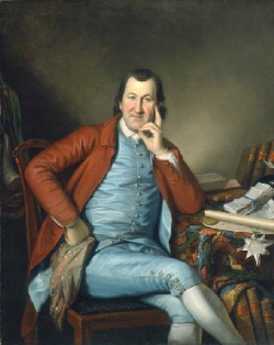
|
| Timothy Matlack |
The Battle of Fort Wilson was the only Revolutionary War battle fought within Philadelphia city limits; a revolution within a revolution, every participant was a Rebel patriot. Reed and Matlack were the two most visibly appalled by the whole uproar, forced by circumstances to attack the forces of their own political persuasion. But it seems very certain that Robert Morris and the other prosperous idealists were also left with an indelible conviction that even a confederation must maintain central command and discipline with an iron will, or all might be lost. A knowledgable French observer estimated that Robert Morris then owned assets worth eight million dollars, an almost unimaginable sum for the time. But he would lose every penny if effective political control could not be restored. A few days later in the October election, he and all the other Republican (conservative) officials lost their seats. It did not matter; Morris then knew what to do, and his opposition didn't.
Robert Morris: Businessman Father of the Bureaucracy
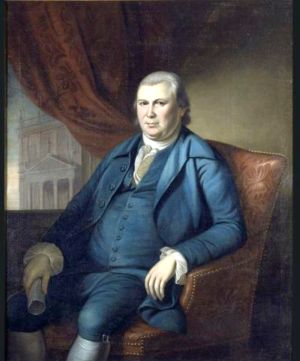
|
| Robert Morris |
UNDER the Articles of Confederation, America had a President who presided, but there was no executive branch for him to do anything administrative. The day to day business of the nation was conducted by committees of Congress, who mainly contracted out the actual work. Evidently, Robert Morris, the businessman had observed this system with displeasure, because it only took him a few days to replace it with departmental employees, reporting to him. The affairs of the nation were evidently in such disarray that there is scarcely any recorded resistance to this astonishing re-arrangement, probably viewed as only one of a series of brisk actions by this foremost businessman of the nation, acting in an emergency and to some extent using his own money. Furthermore, the immediate administrative improvement was apparently so obvious to everyone that the system continued after Morris left office, and was absorbed into the 1787 Constitution without much-recorded debate. Without dissent, as we say, the bureaucracy had been created. As the press of business steadily increased the bureaucracy, from a handful of employees to many millions of them, the fourth branch of government was created without any Constitutional mission statement, not one single word. Following directions set by early America's preeminent no-nonsense businessman, control of the bureaucracy was placed within the Executive branch, in time largely located within the District of Columbia, and governed by rules made by the Civil Service Commission. Sometimes this fourth and largest branch of government skirts dangerously close to encouraging insubordination to their politically appointed superiors.
For some reason, the State Department is particularly suspected of such "Yes, Minister" behavior. Increasingly, government subcontractors are relied upon ("privatization"), as the growth of public sector workforces a return to the subcontractor approach of two centuries earlier; such subcontractors increasingly find the bureaucracy assumes the role of the second Board of Directors. And for the same reason as before: the work of the central government keeps increasing. At a state and local level, an uncomfortable amount of political funding can be traced to utilities and other corporations who have been awarded legal monopolies, uncomfortably like the mercantilism which our colonist ancestors had found so repugnant to deal with. In the 21st Century, we are finally approaching the point where we can foresee the number of people working for some level of government becoming greater than the number of voting citizens, and therefore able to control their income and the nature of their work. When the bureaucracy begins to exert political election power over its elected superiors, elected politicians are almost certain to rebel at what they will surely see as going a step too far. However, on the topic of salary and work environment, they are likely to become allies. Public discontent is already echoed in the growing political movement to limit or shrink the size of government; it would be well to examine and pilot test alternative options before this one gets us into trouble.
In retrospect, this was one of many features of creating the three branches of government where broader implications went unnoticed in 1787. The British government had three branches, King, Parliament, and Judiciary. To create a government consisting of a President, a Congress, and a Judiciary did not then seem like much of a departure. However, the Revolution deposed the King and made the people sovereign. When the real implications of that breezy slogan had to be translated into legislative language serious implications emerged, unexpected then, and now hard to change.
Reconsidering All Our Laws
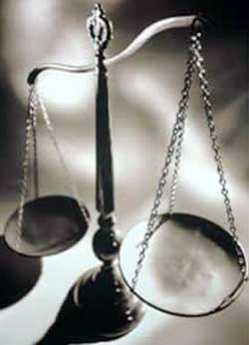
|
| Common Law |
A KING who conquers a new country theoretically gains the chance to revise all its laws. However, thousands of years of experience demonstrate that those who are good at wielding the sword seldom have much interest in, or aptitude for, devising a legal code. Napoleon seems to have been an exception, and Alexander the Great was tutored by Aristotle, but most conquerers have been illiterate in the law. Therefore, earlier conquerors merely extended their native laws into additional territory or else left the whole business to a permanent priesthood of judges. In this way, an independent judiciary could survive unless, like Thomas a Becket or Thomas More, it grew stubborn about thwarting the wishes of the King. The concept of citizen rights more or less defined feasible limits to what the King was allowed to do. British law went still further, distinguishing between rights of the people and rights of the sovereign. It identified those few things even a King was not allowed to do, as well as those many things he alone must be able to do in order to govern. The latter were collectively called the King's Prerogative. Today, we would call it a job description.
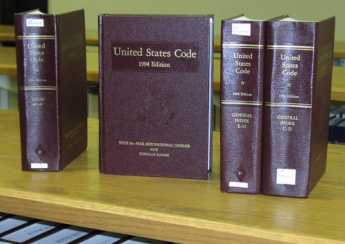
|
| U.S. Codes |
Along those lines, the English Civil War had been fought, briefly transferring the power of Prerogative to Parliament, and incidentally clarifying some disadvantages of doing so. Americans, after fighting an eight-year Revolutionary War to be rid of a particular king, had developed a sentiment for eliminating all kings entirely. However, the memory of the English Civil War and subsequent abuses by the Cromwell Parliament restrained that impulse. The alternative idea grew of transferring sovereignty to the people, to be translated into action by their elected representatives in the Legislative branch. Although such sovereignty would be unlimited, the intermediate steps taken by the Legislature could be deliberately slowed down, and particularly worrisome actions might be tangled up in complicated steps of legal process by a vocal minority. Such a complicated system required an umpire, which Chief Justice John Marshall eventually positioned the Supreme Court to be. Conducting elections every two years was a simple way to allow the people to restrain its agents from the misbehavior of a more general sort. Since George Washington was confidently expected to be the first President, it was left to him to devise protections against presidential abuse, since he had notoriously and repeatedly expressed his intense dislike of kings. In modern times this system of checks and balances has only been severely tested once, in 1937. Immediately after winning a landslide re-election in 1936, Franklin Roosevelt nevertheless was slapped down hard by public outcry forcing Congress to thwart his Supreme Court-packing scheme.
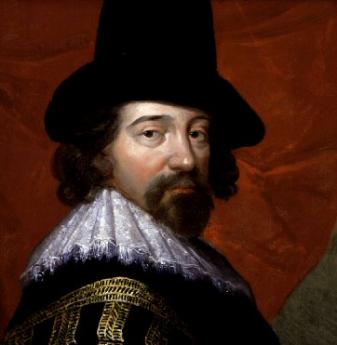
|
| Sir Francis Bacon |
Such subtle, complicated ideas cannot be implemented by writing 6000 words on a piece of paper, and they certainly cannot withstand two hundred fifty years of subsequent nit-picking by dissenters, no matter how carefully crafted the 6000 words may have been. The complexity of the political system it describes would long ago have fallen apart without a million little accommodations and revisions, just as every other nation's constitution has done during that same period of time. And that fine-tuning process was made possible by starting with a more or less blank slate, with thousands of lawyers and legislators debating every particle of common law for more than a century. In 1787 it was decided to adopt English common law as a default position, and to invite a host of legislative bodies to debate and replace any part of it with a "statute". It was a laborious process. Measured by pages of law books, the volume of statutes only grew to equal the volume of common law by the time of the Civil War. The English common law was certainly a good place to start, having been created by Sir Francis Bacon two hundred years earlier as the legal equivalent of the Scientific Method; based on real, adversarial contested case decisions, a hypothesis was created, then tested, revised, and tested again. By actual count, one state legislature only enacted three statutes in the year before the Constitution was ratified; all its other activity was concerned with adjudicating disputes within the boundaries of the existing common law. But when the Constitution suddenly rearranged the balances of power in 1787, almost every sentence of common law had to be regarded as potentially requiring modification to reflect the new Constitutional rearrangements. During the first half century there existed great enthusiasm for almost all of the new Constitution except those parts which affected slavery, the fine-tuning was almost universally intended to strengthen it or repair some oversight. If it failed in some way, adversaries were quick to point out the flaws. In short, every lawyer in the nation was involved to some degree for a century in the process of re-writing the English common law for American purposes, in American circumstances, for the grander purpose of strengthening the American commonwealth.
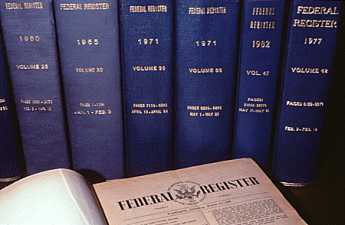
|
| Federal Registry |
And everyone knows what happened next. The state legislatures who considered it normal to pass fewer than a dozen laws in a year started passing fifteen hundred in a year and kept it up for many years. Today, almost every state legislature considers more than a thousand bills and passes two or three hundred. Since the colonial legislatures passed few laws and spent most of its time adjudicating disputes about existing law, the character of the law changed as it gradually gave up adjudicating, stopped being like a court. The tendency of early law was to state principles to guide the judges. In recent times, our over-lawyered system specifies all imaginable conditions and exceptions in excruciating detail, so that our laws tend less and less to speak of "reasonable amounts" and more and more to define drunken driving, for example, in milligrams per deciliter of the defendant's blood. We have better measuring devices, so we measure. But who can deny that a legislature accustomed to making judgments itself, will more confidently rely upon the good judgment of courts, than a legislature which spends its time going to committee meetings to consider the testimony of experts, often never visiting a courtroom?
Our lawyers, who once enlisted the efforts of the entire profession for a century into refining the English common law into the American statutory law, are to be encouraged to extend equal effort into the process of turning off the faucet. Or possibly, having done such a good job at this assignment, seek another line of work?
Corporations: Property, but also Immortal Persons
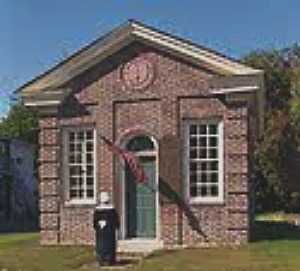
|
| Proprietor House |
The Proprietorship of West Jersey is the oldest stockholder corporation in America. Devised by William Penn it has been doing business in Burlington, New Jersey since 1676. The Proprietorship of East Jersey may possibly have been created slightly earlier by William Penn, but recently dissolved itself, thus leaving a clear path for West Jersey to claim to be the oldest. For a hundred years before 1776, corporations were devised by the King through royal charters, and for a century after 1776, most state legislatures passed individual laws to create each corporation, one by one. Consequently, there were a great many variations in the powers and scope of older corporations, with a heavy emphasis on the purpose to which the business was limited. Eventually, so many corporations were created that a body of law called the Uniform Law of Corporations simplified the task of incorporation for the legislatures. The Proprietorships of East and West Jersey would now probably be described as real estate investment trusts (REIT), but the Uniform laws now tend to diminish the emphasis on corporate purpose. It is now common to have a corporation proclaim the ability "to do whatever it is legal to do."
Many voices have been raised in opposition to corporations, largely claiming unfairness for a large and established corporation to compete with newcomers, especially small newcomers striving for the same line of business. Because of its immortality, a stockholder corporation can achieve dominance no individual could hope for, while because of its multi-stockholder ownership, it can generally raise larger amounts of capital. Moreover, because of its size and durability, a corporation can become more efficient and offer the public lower prices and higher quality. As much as anything else, a corporation can generally hire more employees and pay them higher wages; as even the unions admit, corporations create jobs, jobs, jobs. No doubt, state legislatures are attracted by the tax revenue derived from major corporations, but the quickest way to stimulate the economy has repeatedly been found to grow out of lowering corporate taxes. Since there is scarcely any purpose of creating a for-profit corporation unless it eventually pays its stockholders some kind of dividend, all corporation taxes have the handicap of double-taxation for a fixed amount of business. The Republic of Ireland recently lowered its corporate tax rate severely and triggered so much new corporate activity that it inflated and destabilized its whole economy. The result was a dangerous economic crisis, but politicians privately and world-wide silently derived only one real conclusion: lower your corporate taxes if you are looking to stimulate jobs, jobs, jobs.
The corporate model of business thus looks pretty safe, in spite of envious criticism, and is what most people mean when they speak of capitalism. The Constitution had the intention of extracting Interstate Commerce for the Federal Government and leaving the regulation of every other business to state legislatures. The Roosevelt Supreme Court-Packing dispute of 1936 twisted the meaning of Interstate Commerce to mean almost all commerce, but Congress wasted no time specifically exempting the "Business of Insurance" from federal regulation and returning it to the state legislatures in the 1945 McCarran-Fergusson Act. Although the matter remains one of some dispute, it is roughly correct to say that all commerce is federally regulated, except insurance. The corporation is nevertheless usually a creation of some legislature, and legislators have wide latitude in regulating them. To illustrate, in the early days of a banking corporation, the Bank of Hartford was delayed in receiving incorporation by the strong legislative suggestion that a closed stockholder list would result in refusal to incorporate them, whereas opening up the list to new stockholders might result in rapid approval. The implication was strong: the legislators wanted some cheap or free stock as a condition of incorporation. The following year, 250 banks were incorporated, and the year after that, over 400 more. Making of incorporation applicants by politicians was sharpened to a fine point in Pennsylvania in the late 19th Century, when legislatures accorded monopoly status to public utility corporations, withholding it from competitors. It is now a textbook statement that the funding of substantially all municipal political machines is derived from voluntary contributions by utilities with politically granted monopolies, who are consequently indifferent to the retail prices of their products.
So there is still room for public concern and vigilance, and both the courts and the Constitution protect but restrain corporations. In the early 19th Century when public opinion was becoming firmer about incorporation, it was contended they should be treated as persons, possibly resembling real persons more closely by imposing a finite life span on their charters. Although corporation entities are still to some degree treated like individuals, the legal doctrine prevailed that they are in fact contracts between the state and the stockholders. The paradox is thus defended that although legislatures can create corporations, they cannot dissolve them! After all, a contract is an agreement between two parties, and it requires both parties to agree to dissolve the agreement. And then, the final uncertainty was removed by John Marshall. The U.S. Supreme Court in the Dartmouth College case applied Article I, section 10 of the Constitution. That section provides that state governments may not pass any law impairing the obligation of contracts. The Supreme Court decision written by Marshall made it clear that this provision of Constitution eliminated any distinctiveness between a contract involving a state and a contract involving two citizens. There had been a growing feeling that private property was not to be disturbed by state power, and this linkage to Article 1 affirmed that point and finally settled matters. Shares of company stock were property, protected from state legislatures as belonging to the owner and not to the state in any sense. All the while that this quality of the property was established, certain features of the corporation as a person endured. Most of the attention to this point arose after the Civil War when the mixture of concepts ( a slave was a person who was also private property) more or less applied to the institution of slavery as well. More recently, potential muddles have been created by limiting campaign contributions of corporations, thus impairing their right to free speech in the role of a person. It even appears to be true that some of the 1886 precedents were created by an error of a court reporter. The dominant precedent in operation here would appear to a layman as, "If it ain't broke, don't fix it." Additional centuries including a Civil War thus encrusted conditions and traditions onto the hybrid idea of a corporation which now allows it to stand on its own feet, more or less free at last.
The legal profession can certainly be congratulated for constructing two institutions which include the majority of working Americans -- the corporation and the civil service -- without the slightest mention of either one in the Constitution. Although everything seems to be reasonably comfortable, and no one is actively proposing substitutes, it is uncomfortable to hear so much dissension about the original intent of the Framers, when so much of American Law traces its history to events and institutions which the Framers never imagined. Constitutional Law, both within and without original intent, will soon be dwarfed in effect by non-constitutional accretions to it. Sooner or later, the advocates of some undefined cause could find it in their interest to challenge the Judicial system for what has been allowed to happen. Expediency has triumphed. We started with nothing but the common law (defined as law created by judicial decision), and we are slowly returning to that condition under a different name, misleadingly called statutes.
Owen Roberts: A Switch in Time
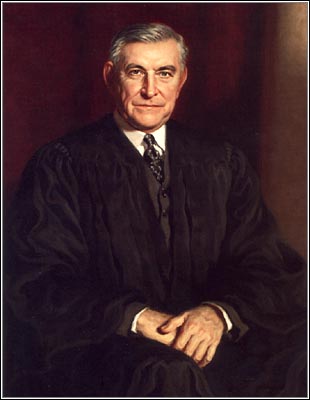
|
| Owen Roberts |
To this day, no one knows quite what to make of Owen J. Roberts, founder of one of Philadelphia's largest law firms. He was Prosecutor of the Teapot Dome scandal, Dean of the University of Pennsylvania Law School, Republican appointee to the U.S. Supreme Court. But then, he abruptly became the source of one of the most radical revisions of our system of government since the Declaration of Independence. Nothing in his prior career and nothing afterward in his subsequent civic-minded retirement from the Court seemed to suggest any radical turn of character had taken place. He has been compared with a famous baseball pitcher who threw right-handed or left-handed at will, unexpectedly, capriciously, who knows why.
The issue went far beyond one clause in the Constitution, but the commerce clause was the focus point. Under the limited and enumerated powers allowed to Congress by the Constitution was :
The Congress shall have power to regulate commerce with foreign nations, and among the several states, and with the Indian tribes.
That used to be called the interstate commerce clause until the Supreme Court announced its decision in the case of Wickard v. Filburn. When linked with the Tenth Amendment, granting to the States the power to regulate everything not specifically granted to the Federal government, this clause in the Constitution was universally taken to mean that the States had control of commerce within their borders, while Congress would control interstate commerce. Wickard v. Filburn took all that power from the states and gave it to Congress, which henceforth would regulate commerce. John Marshall had certainly triumphed over the hated state legislatures, but the Supreme Court suddenly lost its power to overrule Congress, too. One side had won the old argument, by silencing the umpire. No wonder Franklin Roosevelt started annual celebrations called Jefferson-Jackson Day dinners.
To describe the background: The 1929 stock market crash was quickly followed by the economic Depression of the 1930s. Nothing of this magnitude had been seen before, and there was a stampede to try new and untested solutions. Even government action which actually worsened economic conditions was felt justified if it conveyed to the frightened public the image that its leaders were taking firm action. Since Socialism and Communism were among the solutions grasped for, many unfortunate actions were felt justified as a way to control the Bolshevik threat. Many of these New Deal actions were declared unconstitutional by the Supreme Court since they involved sweeping revisions in the way all commerce, internal to the States as well as interstate, was conducted.
The Depression and financial panic continued through the 1936 Presidential election, which Roosevelt won in a landslide. Immediately after the start of the new term, he announced a plan to increase the number of Justices on the Supreme Court, appointing new ones more to his liking. He was at pains to point out that seven of the nine life incumbents had been appointed by Republican Presidents. This was, of course, the restraint intended by the Constitutional Convention, and the idea of packing the Court with new appointees was exactly what Jefferson and Jackson had tried to do.
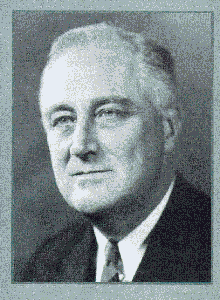
|
| Franklin Roosevelt |
In the meantime, the case of Filburn, a dairy farmer, came up. One of the New Deal agencies had assigned him a quota of 200 bushels of wheat he could grow on the side, as part of an effort to raise wheat prices by reducing supply. Filburn had raised 400 bushels, but consumed the extra wheat for his own personal use, hardly a matter of interstate commerce. The Court had repeatedly declared laws like this to exceed the interstate commerce limitation and were thus unconstitutional for the Congress to enact.
Well, Owen Roberts changed his position, Filburn lost his case. Forever afterward, this change of position was referred to as the switch in time, that saved nine. Since that time, the Court has rarely had the courage to rule any action of Congress unconstitutional, even though it is true that Congress promptly and resoundingly rejected the court-packing proposal.
And furthermore, the power of the state legislatures has shriveled because all commerce (except insurance and real estate) is federally regulated, with a corresponding vast increase in the size of the Federal bureaucracy, as Congress relentlessly pushes to intervene in commerce among the several states, formerly known as the Interstate Commerce Clause. Franklin Roosevelt had a certain right to gloat at Jefferson-Jackson Day dinners.
A few weeks before he died, Owen Roberts had all his papers burned. Apparently, we will never know whether the present outcome was the result he had in mind. Since he was later the author of Alfred Barnes' will, which strenuously sought to prevent the transfer of the Barnes art collection to Philadelphia County, anything written by a lawyer can apparently be reversed by other lawyers. One would have supposed that either the Original Intent would govern, or else the opinion of the Supreme Court on what the Constitution means, would prevail. Franklin Roosevelt showed us there is a third possibility: the President can overrule the Court by intimidating it.
Condominiums, Revisited

|
| Barbara Greenfield |
Barbara Greenfield died last year, and like her father was a real estate dealer. She was naturally all over town at one event or another, and at one such event, it was said she lived in a penthouse on Rittenhouse Square. I never saw her apartment, but it was part of the Greenfield lore that she lowered the floor and raised the ceiling, to make the place seem grander. Otherwise, this yellow-brick apartment building looked rather ordinary for a place built in 1928 by Horace Trumbauer himself. It was 28 stories high, and like the Racquet Club on 16th and Locust, it had the Trumbauer signature feature of an interior skeleton of massive steel beams, allegedly from the same source as the Benjamin Franklin Bridge, very solid, indeed.
Well, the Right Angle Club meets in the Racquet Club, so it was with considerable interest that we had two visitors, Melanie Rodbart and Jessica Senker, of guess what the J&M Preservation Studios, on the subject of 222 West Rittenhouse Square, one of their latest projects. It seems there were some cracks in the facade at the joins, and worse still, places where the brickwork bulged outward. Taking binoculars up a few floors in neighboring buildings, and getting lifted in the buckets of some cranes, it was possible to see there were indeed some repairs in the brick facade needed. Eventually, when the overlying bricks were removed, it was then possible to see corrosion on the steel beams had caused them to expand, so there was a need for much more expensive replacement of entire beams. Ouch, that's expensive indeed. At the very least, the sidewalks had to be closed while there was a danger of brickwork falling off to hit pedestrians below.

|
| condominium repairs |
There was a contractor sitting near me, so I asked him what he did about condominium repairs. The answer was prompt: he refused the business. It reminded me there was a time not so long ago when condominiums were illegal in Philadelphia, and it was contended this was considered an impediment to progress in the center of the city. As of course, it might well be, but how many condominium buyers anticipate the uproar which might result from arguments about paying for large shared expenses that are no one's particular fault? From what little I can see, all condominiums divide into two political parties: the half who want to spend money to fix the place up, and the half that can barely afford the payments on what they have. Add some lawyers to the mix, and it makes you wonder how wise it is to get into all that?
13 Blogs
Franklin Endorses the Constitution
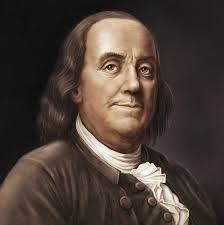 e3Benjamin Franklin never revealed his contributions to the formation of the U.S. Constitution, whether victories or defeats. When the final vote had been taken, he urged unanimous support by the delegates, in the following words.
e3Benjamin Franklin never revealed his contributions to the formation of the U.S. Constitution, whether victories or defeats. When the final vote had been taken, he urged unanimous support by the delegates, in the following words.
WILLIAM BLATHWAYT'S DRAFT OF THE CHARTER OF PENNSYLVANIA
William Blathwayt was clerk of the British Board of Trade. His draft of Penn's charter for Pennsylvania was essentially a staff proposal for the King to sign. It conforms to the final charter in all but minor wording [,punctuation, and emphasis marks].
Political Parties, Absent and Unmentionable
 Our Constitution is much praised for exquisitely balancing power between the three branches of government. It would even be an achievement to require two centuries to find a way to unbalance them.
Our Constitution is much praised for exquisitely balancing power between the three branches of government. It would even be an achievement to require two centuries to find a way to unbalance them.
Franklin Teaches Investing to Boston and Philadelphia
 In 1789, B. Franklin changed the nature of his last will and testament from conventional to highly unconventional.
In 1789, B. Franklin changed the nature of his last will and testament from conventional to highly unconventional.
Net Neutrality and Vertical Integration
 Net neutrality is a new issue with several other issues buried in it. Here we take up its relation to antitrust, particularly the legal concept of vertical integration.
Net neutrality is a new issue with several other issues buried in it. Here we take up its relation to antitrust, particularly the legal concept of vertical integration.
Do Computers Thrive on Lead Poisoning?
 There's a rumor that regulations prohibiting lead in solder will shorten the life of computers.
There's a rumor that regulations prohibiting lead in solder will shorten the life of computers.
Adrift With The Living Constitution
.jpg) With apologies to any political tricks left unmentioned.
With apologies to any political tricks left unmentioned.
Fort Wilson: Philadelphia 1779
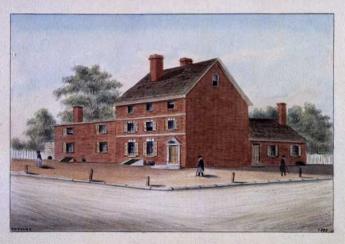 History was made at 3rd and Walnut, but so far, is unmarked.
History was made at 3rd and Walnut, but so far, is unmarked.
Robert Morris: Businessman Father of the Bureaucracy
 Only a few days after being appointed Financier, or acting President of the United States before the Constitution, Robert Morris swept away Congressional committees and replaced them with administrative employees.
Only a few days after being appointed Financier, or acting President of the United States before the Constitution, Robert Morris swept away Congressional committees and replaced them with administrative employees.
Reconsidering All Our Laws
 The legislatures of America were handed a clean slate for statutes by the 1787 Constitution, and thus given the opportunity to review the entirely legal system. It took nearly a century to accomplish and is still proceeding.
The legislatures of America were handed a clean slate for statutes by the 1787 Constitution, and thus given the opportunity to review the entirely legal system. It took nearly a century to accomplish and is still proceeding.
Corporations: Property, but also Immortal Persons
 There had been a few stockholder corporations, dating back to the Dutch East India Corporation and the Proprietors of West Jersey. The Industrial Revolution greatly encouraged this business structure, but America got the jump on the rest of the world by some happenstances.
There had been a few stockholder corporations, dating back to the Dutch East India Corporation and the Proprietors of West Jersey. The Industrial Revolution greatly encouraged this business structure, but America got the jump on the rest of the world by some happenstances.
Owen Roberts: A Switch in Time
 His old law firm devotes a reception room in his name, but not everyone is pleased with his writing the documents establishing the Barnes Foundation, or his capitulation to Franklin Roosevelt's threat to pack the US Supreme Court.
His old law firm devotes a reception room in his name, but not everyone is pleased with his writing the documents establishing the Barnes Foundation, or his capitulation to Franklin Roosevelt's threat to pack the US Supreme Court.